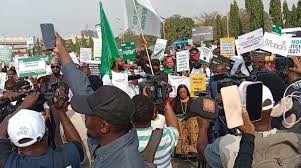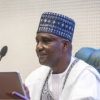The National Assembly’s recent endorsement of President Bola Tinubu’s proposal to secure a ₦1.15 trillion loan from the domestic debt market has generated significant discourse regarding deficit financing and its impact on Nigeria’s economy. Despite earlier reports indicating that revenue targets for 2025 had been achieved, the increased national budget resulted in a funding shortfall.
The National Assembly’s recent endorsement of President Bola Tinubu’s proposal to secure a ₦1.15 trillion loan from the domestic debt market has generated significant discourse regarding deficit financing and its impact on Nigeria’s economy. Despite earlier reports indicating that revenue targets for 2025 had been achieved, the increased national budget resulted in a funding shortfall. The President considered it essential to address this gap to facilitate the successful implementation of government initiatives.
The 2025 Budget and Rising Deficit
In 2025, the President initially presented a budget of ₦54.74 trillion. However, during the review process, the National Assembly increased the budget to ₦59.99 trillion, allocating an additional ₦5.25 trillion to projects and programmes identified as requiring further funding. This revision immediately increased the disparity between projected government expenditures and anticipated revenues.
Although the administration reported an improvement in revenue performance, the expanded budget resulted in revenue being insufficient to cover all approved government expenditures. Consequently, the total budget deficit increased to ₦14.10 trillion. Of this amount, ₦12.95 trillion was authorised for borrowing, leaving an unfunded shortfall of ₦1.15 trillion.
On November 4, 2025, the presidency sent a request to the Senate seeking approval for the remaining loan to support the execution of government programs and projects outlined in the 2025 fiscal plan.
In a letter to the National Assembly, President Tinubu stated that additional borrowing is required to address the funding gap and support the comprehensive execution of government programmes and projects outlined in the 2025 fiscal plan. He noted that, despite improved revenue performance, the revised budget necessitates supplementary funding to adequately fulfil the government’s objectives.
Purpose of the Loan
The ₦1.15 trillion domestic loan constitutes a crucial component of Nigeria’s 2025 fiscal budget plan. Its primary purpose is to facilitate the timely implementation of all sanctioned programmes, projects, and interventions. Legislators emphasised during the loan’s approval in the House that this borrowing is not designed to increase debt irresponsibly, but rather to fulfil obligations already delineated within the approved budget.
Senator Sani Musa, who chairs the Senate Committee on Finance, emphasized that legislative approval of the domestic loan is essential to ensure proper funding for the 2025 budget.
Senator Adetokunbo Abiru stated that the proposed borrowing would not negatively impact Nigeria’s debt profile, as it is already incorporated into the 2025 Appropriation Act under deficit financing. He further noted that a portion of the funds will be allocated towards refinancing maturing Eurobonds, thereby averting potential defaults.
Senator Adams Oshiomhole stated that borrowing is acceptable if it is well-managed and directed towards important issues such as unemployment and infrastructure problems.
How Will the Loan Benefit Nigerians
The government claims the loan will fund key projects in infrastructure, healthcare, and agriculture that impact daily life. Without timely funding, these efforts stall, hindering economic growth and job creation, and raising living costs. A fully financed budget reassures ministries and contractors that their work can proceed without funding interruptions.
The loan offers clear benefits for citizens by enabling full funding of the 2025 budget, thereby supporting the continuation of infrastructure projects, social programs, and employment-generating initiatives. Key sectors—including power, transport, agriculture, and security—are poised to benefit from sustained financial support. As Senator Adams Oshiomhole stated, borrowing can be appropriate when it is well-structured and directed towards addressing critical challenges such as unemployment and infrastructure deficits.
Fully financing the budget helps guarantee timely payments to contractors and service providers, avoiding delays that might impact the broader economy. Additionally, it assures businesses and investors that government spending obligations will be met, which promotes economic stability and activity.
Economic Implications
Atoberu Joshua, a Financial Policy Analyst, discussed the challenges associated with government borrowing, its implications, and recommended measures for the Nigerian government to improve economic outcomes and reduce reliance on frequent loans.
“The Federal Government’s request for an additional ₦1.15 trillion domestic loan has raised many questions because it comes at a time when Nigerians are already struggling with high prices, weak purchasing power, and economic uncertainty.
“If the government uses ₦1.15 trillion to fund productive projects such as improving electricity, supporting agriculture, developing transportation, expanding local industries, and strengthening technology infrastructure, then the loan can stimulate the economy because productive projects create jobs, improve business activity, and expand the tax base. All of this helps the government generate revenue to repay the loan. In this case, the borrowing becomes an investment that pays off in the future.
He added that, “If the money ends up being used for recurrent expenses such as salaries, political appointments, foreign trips, allowances, or administrative overhead, then the loan will not create any economic value. The country will be left with more debt and no meaningful development. This is where the danger lies; borrowing without productive return turns into a cycle of dependency, where the government continually borrows just to survive.
“To prevent negative consequences, the government needs to take certain steps. The first is transparency. Nigerians deserve a clear, public explanation of what the ₦1.15 trillion will be used for, how the projects will be implemented, and how the spending will be monitored. When the public can track how money is spent, waste and corruption reduce significantly. Transparency builds trust.
“The second step is to cut unnecessary government spending. Nigeria spends too much on maintaining political offices, running ministries, and funding agencies with overlapping functions. If the government reduces waste, it will need to borrow less.
““Finally, Nigeria needs a long-term plan that reduces the country’s dependence on loans. This involves improving local production, strengthening exports, stabilising the power sector, and supporting industries that create jobs. A strong economy depends less on borrowing and more on revenue generated from productive activity,” he advised.



















